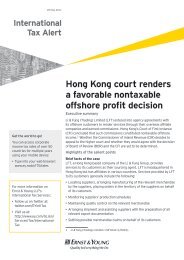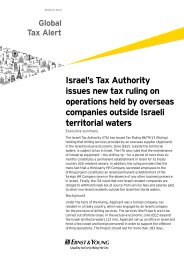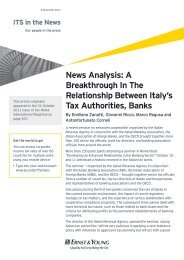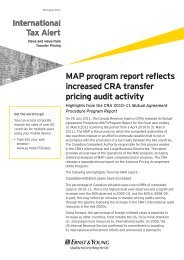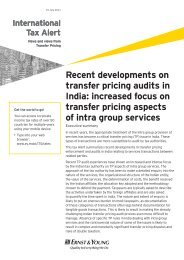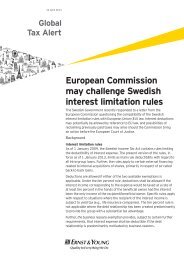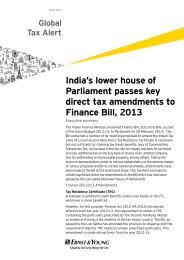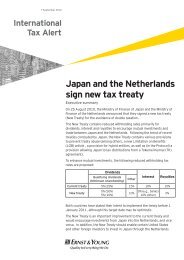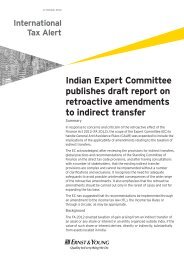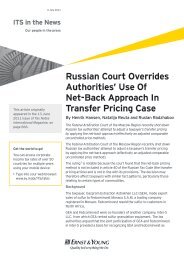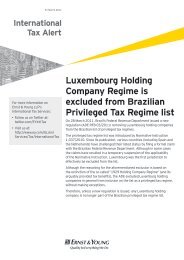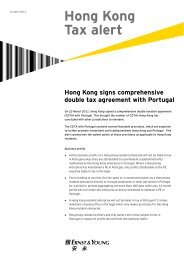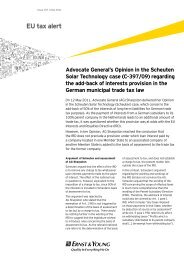(GST) compliance obligations (pdf, 5.62 MB) - Ernst & Young T ...
(GST) compliance obligations (pdf, 5.62 MB) - Ernst & Young T ...
(GST) compliance obligations (pdf, 5.62 MB) - Ernst & Young T ...
Create successful ePaper yourself
Turn your PDF publications into a flip-book with our unique Google optimized e-Paper software.
A recent OECD conference 8 recognized the practical difficulties<br />
that VAT legal systems face in a globalized economy. Several<br />
speakers approved of simplification proposals, such as an<br />
easing of the documentary requirements needed to support<br />
transactions and the introduction of a single VAT rate. Do these<br />
reforms have an impact? What are other ideas could improve<br />
the VAT system for the benefit of MNE taxpayers and tax<br />
administrations?<br />
We solicited feedback on reducing the multinational<br />
VAT <strong>compliance</strong> burden and improving the taxpayer/tax<br />
administration relationship from our <strong>Ernst</strong> & <strong>Young</strong> Indirect Tax<br />
network of VAT professionals, and from selected tax directors<br />
of multinational companies and tax administration officials. We<br />
report on their suggestions for improvements and the “wish<br />
list” of changes that tax directors believe would improve their<br />
multinational VAT <strong>compliance</strong> performance. The comments<br />
accord with the OECD’s Taxation Framework Conditions 9 , a<br />
set of broad principles that the OECD believes should apply to<br />
electronic commerce (sometimes referred to as the Ottawa<br />
Framework).<br />
Neutrality<br />
Everyone we interviewed agreed with the OECD framework that<br />
“business decisions should be motivated by economic rather<br />
than tax considerations.” However, many interviewees felt that<br />
this is not being achieved in practice. Several VAT directors<br />
expressed concern that business decisions in their organizations<br />
are currently being influenced by factors related to VAT<br />
<strong>compliance</strong>, such as the desire to avoid foreign VAT registrations<br />
or incurring irrecoverable VAT. Several taxpayers noted that<br />
it is more difficult for non-resident VAT taxpayers to deal with<br />
detailed local <strong>compliance</strong> requirements.<br />
8<br />
OECD High Level VAT Conference, Lucerne 9–10 September 2009<br />
9<br />
Electronic Commerce: Taxation Framework Conditions OECD 1998<br />
Suggestions for improvement in this area included:<br />
► Extension of arrangements for refunding foreign VAT<br />
► Simplified foreign VAT refund procedures<br />
► Faster foreign VAT refunds<br />
► Harmonization of VAT rules for cross-border trade to avoid<br />
double taxation<br />
Efficiency<br />
31 VAT and <strong>GST</strong>: multiple burdens for multinational companies<br />
Minimizing <strong>compliance</strong> costs for taxpayers and administrative<br />
costs for the tax authorities was also an issue addressed by<br />
the taxpayers, tax administrations and VAT professionals we<br />
interviewed. Many organizations are using shared services<br />
centers to meet their multinational VAT <strong>obligations</strong>, which<br />
increases operational efficiency but may increase tax risk.<br />
Suggestions for improvement in this area included:<br />
► Harmonization of VAT rules<br />
► Harmonization and standardization of VAT reporting<br />
<strong>obligations</strong> (including a single EU VAT return)<br />
► Harmonization and standardization of VAT invoicing<br />
<strong>obligations</strong> and invoicing format<br />
► Harmonization of VAT rules for cross-border trade to avoid<br />
double taxation<br />
► Consistent VAT treatment between EU countries<br />
► Longer filing deadlines to allow taxpayers to “get it right the<br />
first time”<br />
► Adoption of monthly invoicing and e-invoicing regulations<br />
► Increased use of reverse charge accounting to avoid foreign<br />
VAT registrations and VAT cash flow impacts<br />
► Extension of the EU “one-stop-shop” VAT registration concept<br />
beyond electronic services (to reduce the number of VAT<br />
registrations)



